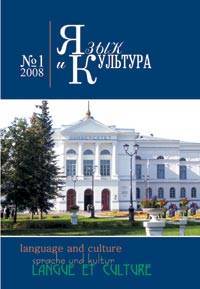The notion of "Connector" in linguistics
The article deals with the linguistic essence of the word "connector" which has been actively introduced in the terminology of syntax recently. This notion competes with the traditional ones "conjunction" and "conjunctive word". The authors present a historico-graphic analysis of the term, disclose its notion and functional grammatical potential, reveal definite criteria which confirm its logical, cognitive and linguistic status. Connectors as linguistic units realize coherence of the text, create and structure the discourse. The questions which arise in this connection are linked first of all with the definition of "connector" in the linguistic sense and its separation from a grammatical particle, a pronoun adverb, a prepositional combination or a sentence, namely its reference to a definite category of grammar units. Connectors with their syntactic, semantic and pragmatic qualities are interlaced into the functional system of the German language. Hence, the purpose of the article is the description of their functional properties. The contrastive analysis of connectors in German and Russian presents interest for readers as it helps arrive at the conclusion about universality of linguistic essence of connectors. The authors' point of view on connectors analyzed in the article is based on methodology of the syntactic school (The Institute of the German language, Mannheim, Germany) within which there is a theory describing the meanings of connectors and their syntax in modern German (U. Brausse, E. Breindl, R. Pasch, U.-H. Wassner). The authors analyse conceptional transitions between semantic relations which are expressed by sentences. Special attention is paid to the function of connectors in this linguistic process and it leads to the opportunity of revealing their functional synonymy. Connectors can simultaneously belong to the lexical and grammatical fund of the language, therefore, in the authors' opinion they can present scientific interest for cognitive semantics as they present cognitions as a process and result of epistemology. In this connection the perspective of further research of connectors lies in the sphere of cognitive modeling.
Keywords
коннектор,
коннекс,
релят,
союз,
дискурсоорганиза-тор,
функтор,
часть речи,
connector,
connex,
relat,
conjunction,
discourse-organizer,
functor,
part of speechAuthors
| Golubeva N.A. | Linguistics University of Nizhny Novgorod | nagol@mail.ru |
| Zyeva E. V. | Linguistics University of Nizhny Novgorod | lenskaja.wind.ru@rambler.ru |
Всего: 2
References
Голубева Н.А. Когнитивный аспект уступительных союзов-слов // Когнитивные про цессы и изучение иностранных языков : межвуз. сб. науч. ст. Н. Новгород : НГЛУ им. Н.А. Добролюбова, 2005. С. 218-230.
Голубева Н.А. Грамматические прецедентные единицы в современном немецком языке : дис.. д-ра филол. наук. Н. Новгород, 2010. 417 с.
Берзина Г.П. Уступительный концепт как интегративный комплекс // Когнитивные исследования языка. 2012. Вып. XI. С. 359-362.
Берзина Г.П. Моделирование интерпретирующего потенциала когнитивной области "Normverletzung" категории уступительности // Когнитивные исследования языка. 2017. Вып. XXX. С. 213-216.
Болдырев Н.Н. Когнитивная семантика. Введение в когнитивную лингвистику : курс лекций. 4-е изд., испр. и доп. Тамбов : Издательский дом Тамбов. гос. ун-та им. Г.Р. Державина, 2014. 236 с.
Кондаков Н.И. Логический словарь-справочник. 2-е изд., испр. и доп. М. : Наука, 1975. 720 с.
Pasch R., Braufie U. et al. Handbuch der deutschen Konnektoren. Linguistische Grundlagen der Beschreibung und syntaktische Merkmale der deutschen Satzverknupfer (Kon-junktionen, Satzadverbien und Partikeln). Berlin, New York : de Gruyter, 2003 (Schriften des Instituts fur Deutsche Sprache. Bd. 9). 733 s.
Metrich R Konnektoren definieren - aber wie? // Textkonnektoren und andere textstrukturierende Einheiten / Hrsg. A. Cambourian. Tubingen : Stauffenburg, 2001 (Eurogramma-tik 16). S. 19-31.
Engel U. Deutsche Grammatik. Heidelberg : Groos, 1988. 888 s.
Schanen F. Textkonnektoren: der begriffliche Hintergrund // Textkonnektoren und andere textstrukturierende Einheiten / Hrsg. A. Cambourian. Tubingen : Stauffenburg, 2001 (Eu-rogrammatik 16). S. 1-17.
Инькова-Манзотти О.Ю. Коннекторы противопоставления во французском и русском языках : автореф. дис.. д-ра филол. наук. М., 2001. 47 с.
Schonborn Ch. Kardinal. Mein Jesus. Gedanken zum Evangelium. Wien : Molden Ver-lag, 2002. 283 s.
Bluhdorn H., Golubeva N.A. Konzessivkonnektoren und ihre morphologischen Bestand-teile im Deutschen und im Russischen // Das Wort (germanistisches Jahrbuch Russland). Bonn : DAAD, 2007. S. 77-100.
BrUcken schlagen. Grundlagen der Konnektorensemantik / H. Bluhdorn, E. Breindl, U.-H. WaBner (Hrsg.). Berlin ; New York : Walter de Gruyter, 2004. 434 s.
Grammatik der deutschen Sprache / G. Zifonun, L. Hoffmann, B. Strecker (Hrsg.). 3 Bd. Berlin ; New York: de Gruyter, 1997 (=Schriften des Instituts fur Deutsche Sprache). 518 s.
Wafiner U.-H. Konnektoren und Anaphorika - zwei grundlegende sprachliche Mittel zur Herstellung von Zusammenhang zwischen Textteilen // Textkonnektoren und andere text-strukturierende Einheiten / Hrsg. A. Cambourian. Tubingen : Stauffenburg, 2001 (Eu-rogrammatik 16). S. 33-44.
Borchert W. Das Brot // Tonio Kroger. Deutsche Novellen des XX Jh. St.-Petersburg : KARO, 2010. S. 109-114.
Берзина Г.П. Функционально-семантическое поле в современном немецком языке : дис.. канд. филол. наук. Новосибирск, 2002. 189 с.
Breindl E. Konzessivitat und konzessive Konnektoren im Deutschen // Deutsche Sprache. 2004. № 32. S. 2-32.
Урысон Е.В. Союзы, коннекторы и теория валентностей. М. : Ин-т рус. яз. им. В.В. Виноградова РАН, 2012. 20 с.
ThUmmel W. Syntaktische Struktur und die Hypothese der Projektivitat // Zeitschrift fur Sprachwissenschaft. 1991. Jan. 1. S. 2-10.
Белявцева И. В. Место коннекторов в системе средств выражения причинно-следственных отношений (на материале русского и немецкого языков) // Язык, коммуникация и социальная среда. Воронеж : ВГУ, 2008. С. 130-138.

